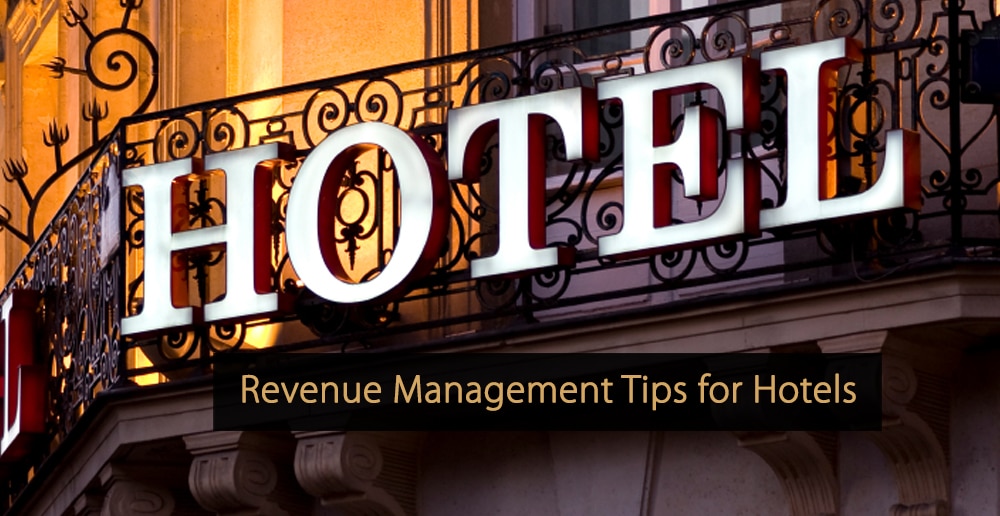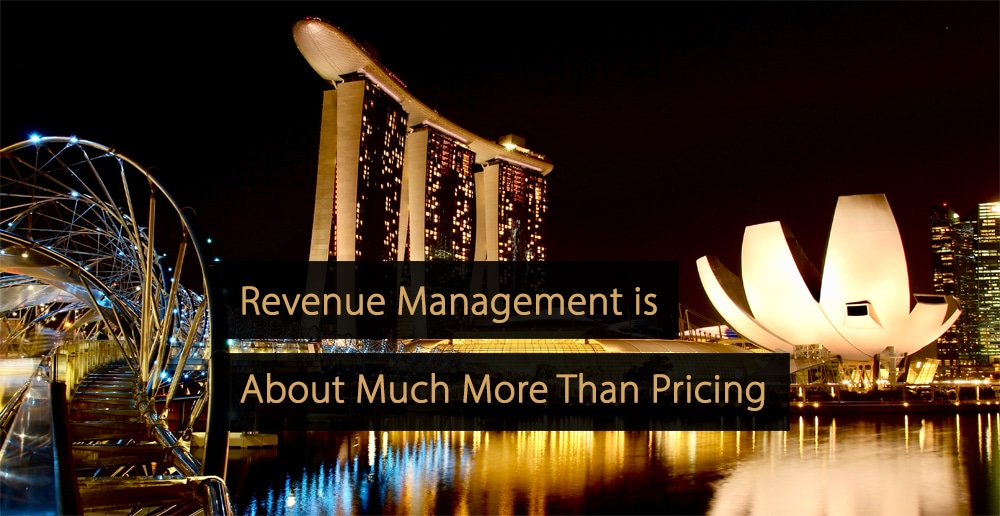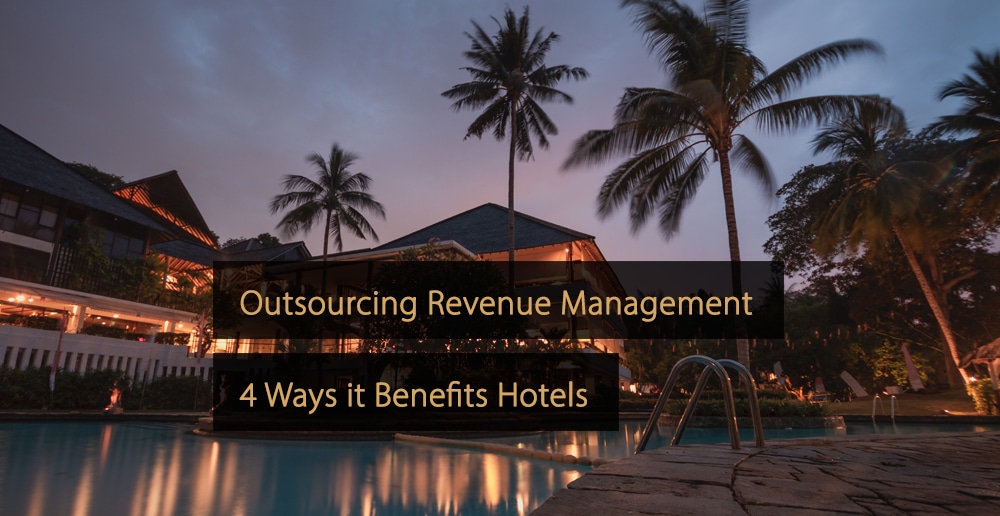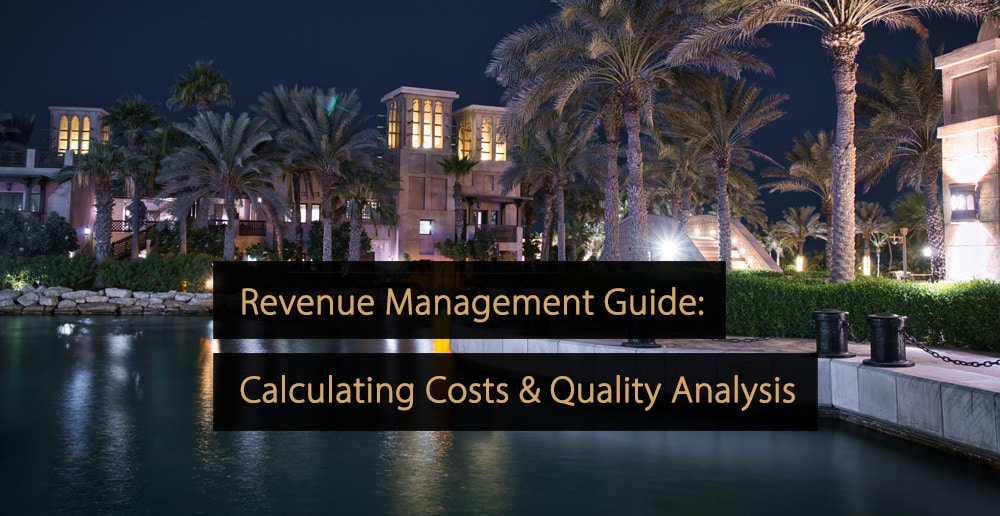Pregunta para nuestro panel de expertos en gestión de ingresos:
Las estrategias exitosas de Total Revenue Management se basan en una excelente comunicación entre todos los departamentos del hotel. ¿Qué consejos puede ofrecer a los equipos de Revenue Management para ayudar a garantizar un esfuerzo colaborativo?
Panel de expertos de la industria
Nuestro panel de expertos de la industria está formado por profesionales de la industria hotelera y de viajes. Tienen conocimientos completos y detallados, experiencia en la práctica o la gestión y son progresistas. Responden preguntas sobre el estado de la industria. Comparten sus conocimientos sobre temas como gestión de ingresos, marketing, operaciones, tecnología y discuten las últimas tendencias.
Nuestro panel de expertos en gestión de ingresos
- Patrick Wimble, director general de Lightbulb Consulting
- Theresa Prins – Fundadora, Revenue Resolutions
- Chaya Kowal – Directora de Gestión de Ingresos, Potato Head Family
- Paulo Aragao – Profesional de gestión de ingresos
- Sandra Gannon – Consultora Comercial, Rompecabezas de Ingresos
- Nikhil Roy – Gerente de Ingresos y Precios, Key Hospitality BV
- Daniel Feitosa – Especialista en Revenue Management
- Daphne Beers - Propietaria, Your-Q Hospitality Academy
- Tanya Hadwick – Líder de ingresos y rendimiento del grupo, SunSwept Resorts
- Pablo Torres – Consultor Hotelero, TSA Solutions
- Edyta Walczak, directora de ingresos del grupo, Arora Hotels
- Mariska van Heemskerk – Propietaria, Revenue Management Works
- Heiko Rieder – Profesional de gestión de ingresos
- Jutta Moore - Directora, Moore Hotel Consulting
- Silvia Cantarella – Consultora de Revenue Management, Revenue Acrobats
- Massimiliano Terzulli – Consultor de gestión de ingresos, Franco Grasso Revenue Team
- Andrew Wheal, fundador y director de Techspert, experto en tecnología hotelera
- Naveed Mirza, director corporativo de gestión de ingresos, Helix Hospitality
- Haga una pregunta a nuestro panel
- Únase a nuestro panel de expertos
“Para cualquier iniciativa de TRM, considérese el DJ de un club nocturno. Puede que no hayas escrito nada de la música, pero reconoces de forma experta qué ritmo se necesita y cuándo, el mejor ritmo, a qué volumen debe sonar y durante cuánto tiempo (¡sin mencionar cuándo bajar el ritmo!). Pero, ¿cómo se traduce esto en TRM?
Reconoce que no tienes que ser el experto en todo. Aproveche las experiencias de los demás e involúcrelos desde el principio.
La reunión sobre ingresos es el lugar donde se acuerdan las iniciativas conjuntas de TRM, pero no es el lugar donde nacen. Puedes hacer el análisis para descubrir el problema y su causa, pero la solución comienza con simplemente sentarte con los líderes que pueden ayudarte a co-crear una iniciativa. La reunión de Ingresos debería ser simplemente el “sello de goma”, es decir, el acuerdo final sobre los detalles y el calendario del camino a seguir.
Piense en quién podría descarrilar una iniciativa y por qué. Trate de mantenerlos a bordo durante todo el proceso e involúcrelos desde el principio. Con demasiada frecuencia veo que grandes iniciativas fracasan porque a un gerente general (u otro líder senior) se le ha mantenido en la ignorancia y no se le ha dado la oportunidad de dar su opinión.
Finalmente, lo que usted puede pensar que es un exceso de comunicación, probablemente no lo sea. Sólo porque algo sea importante no significa que todos los demás lo vean de la misma manera. Comunique sus planes, involucre a otras personas más jóvenes de otros departamentos en la implementación y hágalos responsables. Una vez lanzado, genere entusiasmo. Hable sobre la iniciativa en las reuniones matutinas, 1:1 con otros líderes, reconozca a los demás y celebre las “microvictorias” a lo largo del camino. Utilice la reunión de ingresos como lugar para decidir si necesita corregir el rumbo o cambiar el plan”.
“Los Revenue Managers son responsables de crear una cultura en la organización centrada en la optimización de los ingresos. Es muy importante que inscribamos a cada parte interesada en este proceso, pero en muchos casos, es más fácil decirlo que hacerlo, considerando el tipo de personalidad de un administrador de ingresos típico.
Es importante que cada departamento de ingresos informe sobre sus propios ingresos y gastos. Necesitan ser dueños de sus resultados para impulsarlos. En las reuniones semanales de gestión de ingresos, escuchamos y discutimos los resultados de cada departamento y discutimos estrategias de optimización.
Algo divertido que hago para la comunicación es un boletín mensual (pero también se puede hacer trimestralmente) sobre ganancias y pérdidas de ingresos que incluye un crucigrama o una sopa de letras. Todas las entradas correctas se suman al sorteo”.
“La gestión de ingresos se ha centrado durante mucho tiempo en maximizar los ingresos por habitaciones, pero en los últimos años podemos ver un mayor interés en la gestión de ingresos total.
Para garantizar un esfuerzo colaborativo, diría que el primer paso sería cambiar la mentalidad. La gestión de ingresos se puede aplicar a todos los flujos potenciales de generación de ingresos de un hotel. Ya sea comida y bebida, bienestar, eventos (espacios para reuniones, bodas, grupos) o servicio de limpieza y minibar, todo lo que pueda generar ingresos auxiliares se puede optimizar.
El segundo aspecto importante sería que todas las partes interesadas comprendan el objetivo común y cómo pueden contribuir todos; por lo tanto, la capacitación y la comunicación constante son esenciales. Definitivamente sería útil tener KPI comunes, reuniones periódicas sobre ingresos que incluyan a todos los interesados y tener en cuenta los comentarios de los clientes. Crear algunos incentivos también podría ser una buena idea.
En términos de tecnología, muy a menudo las herramientas no están todas integradas (por ejemplo, el software utilizado en un hotel para habitaciones, comidas y bebidas y eventos puede ser diferente). Podría ser una buena idea integrar sistemas o planear invertir en mejores herramientas para poder rastrear los datos y el comportamiento.
Dependiendo del tipo de hotel, sería interesante trabajar con otros departamentos para crear paquetes de valor agregado que sean auténticos (es decir, no lo que todos los demás están haciendo, como mejoras, créditos de resort, etc.), pero que vayan más allá y entiendan el post-hotel. Comportamiento de los clientes durante la pandemia y lo que realmente buscan”.
“Para lograr un entorno de colaboración exitoso entre diferentes departamentos, los gerentes de ingresos deben ir más allá de las reuniones semanales. Las conversaciones durante la pausa para el café y el refresco de agua son una gran parte de esto. Es durante esos 10 o 15 minutos en que los trabajadores están lejos de sus fortalezas, sin sus computadoras portátiles como armadura, inhibidos y abiertos, que pueden ocurrir valiosos conocimientos e intercambios. Los líderes deberían aprovechar esa oportunidad para hablar sobre los desafíos que enfrentan, las preocupaciones comunes e incluso comentar sobre la última reunión a la que asistieron juntos.
También fuera del tiempo de refrigeración, es importante que los líderes de gestión de ingresos, así como los líderes de otros departamentos, visiten otras áreas y trabajen juntos durante algunas horas. Muy a menudo nos quedamos atrapados en nuestro trabajo, nos quedamos pegados a nuestros escritorios y a nuestro "pequeño mundo", cuando en realidad es muy valioso trabajar junto con personas de otros equipos (respetando las medidas de seguridad de distancia social, por supuesto).
Cuando se construyen esas relaciones, los administradores de ingresos deben crear un entorno de mentalidad de ingresos. Deberían tener 'embajadores de ingresos' en cada departamento del hotel, es decir, miembros del equipo que serán guardianes de la mentalidad de ingresos en sus propias áreas, que se comunicarán con los líderes de ingresos sobre nuevos conocimientos, cambios, sugerencias, etc. Las pausas para el café y las conversaciones con agua fría, trabajar juntos y establecer embajadores son los elementos clave para que cualquier estrategia total de gestión de ingresos prospere”.
“Los equipos de ingresos no pueden trabajar aislados; ellos son los que tienen acceso a los datos y números. Es vital que las tendencias, expectativas e incluso detalles sobre lo que funcionó y lo que no funcionó se compartan con todos los departamentos. No es necesario engañar a los equipos de operación con información demasiado detallada, sino compartir las cifras generales combinadas con las POR QUÉ.
Cada asociado del equipo total del hotel es un generador de ventas e ingresos a su manera. Para tener éxito con la estrategia de ingresos, se necesita la participación de todo el equipo. También recomendaría encarecidamente sesiones de lluvia de ideas con varios departamentos, ya que otras áreas ven la generación de ingresos con otros ojos”.
“La colaboración entre equipos/departamentos es extremadamente importante, más aún en estos tiempos. Por ejemplo, el equipo de Revenue Management debe estar siempre sincronizado con la recepción. Además, la concienciación sobre la gestión de ingresos entre los empleados de recepción es un elemento esencial. Una colaboración en equipo como ésta le ayuda a aumentar las posibilidades de aprovechar al máximo la propiedad y vender el máximo número de habitaciones”.
“Una de las ideas útiles que he experimentado es cuando podemos brindar oportunidades para que todo el personal cree acciones de aumento de ingresos o ingresos auxiliares donde el personal se beneficie de estos ingresos, por ejemplo, con vales de regalo, descuentos para socios, spa de día, etc. Pagamos comisiones por todos los socios que venden el hotel, ¿por qué no podemos comisionar a nuestro equipo y crear esta visión en el personal?
Otra estrategia interesante es formar a todos los departamentos de forma didáctica, aportando situaciones cotidianas y una visión comercial para los equipos. Mostrar los mejores casos siempre puede ser bueno para crear una competencia sana entre los equipos del hotel”.
“Mis sugerencias para impulsar la colaboración son las siguientes:
- Tener implementada una estrategia de comunicación efectiva con todo el equipo. No todo debería ser una reunión. Para ello, la clave son informes fáciles de entender (generados automáticamente). Por ejemplo, una reunión individual de 10 minutos puede ser mucho más efectiva que una interminable reunión mensual sobre ingresos (¡o cualquier otra reunión que se te ocurra!).
- Asegúrese de que la información que proporcione y comparta sea relevante para el departamento. Esto los hace mucho más involucrados en los resultados.
- ¡Muéstrales su contribución! ¿Qué es lo que lograron personalmente o como equipo? Esto crea una organización impulsada por resultados y le da al equipo más valor, orgullo y motivación para participar.
- ¡Celebre los éxitos! El reconocimiento es un factor clave para el éxito”.
“Abrir la reunión de ingresos a todas las áreas. Por lo general, se llevan a cabo sin todos los jefes generadores de ingresos. Alternativamente, invite a personas a participar en un foro abierto. Opere una política de puertas abiertas, donde los miembros del equipo se sientan libres de contribuir o hacer preguntas individualmente para aquellos que no estén dispuestos a discutir en una reunión grupal.
Garantizar la transparencia con los datos, para que todos sepan cómo se ve el negocio y hacia qué apunta el hotel. Compartir los mismos objetivos, KPI e incentivos también es clave para garantizar un esfuerzo colaborativo. ¡Cuántos de nosotros recordamos los días en los que un departamento se centraba en ocupación versus ingresos versus rentabilidad y, por lo tanto, provocaba una desconexión en el entorno de trabajo!
“Empiece por organizar una reunión con todas las partes interesadas involucradas (por ejemplo, a nivel de propiedad, los jefes de departamento) quienes deberían aportar sus ideas para generar más ingresos en sus departamentos/puntos de venta. Estas ideas deben discutirse y generar una lluvia de ideas para determinar cuáles son viables. De ellos, todos pueden discutir y acordar cómo se pueden implementar.
Algunos requerirán la intervención del Revenue Manager. mientras que otros podrían ser implementados por cada departamento. A partir de ahí, configure actualizaciones periódicas para asegurarse de que las ideas se hayan implementado con éxito o, si encuentran desafíos, involucre a los pares relevantes para desbloquearlos ".
“El trabajo en equipo hace que el sueño funcione y creo que comienza con la comprensión, la confianza y la escucha. Todos los departamentos desempeñan un papel clave a la hora de impulsar o respaldar los esfuerzos de ingresos y ventas, por lo que deben tener una comprensión clara de cuáles son los objetivos y cuál es la estrategia para alcanzarlos. En un entorno hotelero ajetreado, lograr que todos participen en una estrategia de ingresos a veces puede resultar un desafío.
Encontrar el método correcto de comunicación es la clave; para algunos departamentos pueden ser reuniones cara a cara o una presentación y para otros, un correo electrónico. Cualquiera que sea el método de comunicación que elija, asegúrese de conocer y comprender a su audiencia. Al explicar los objetivos comerciales, como el presupuesto del próximo año, su enfoque hacia el equipo de Front Office y hacia los equipos de F&B debería ser ligeramente diferente. La buena comunicación también promueve la motivación y crea mejores relaciones entre departamentos.
Otro consejo que me gustaría compartir es el de ser un buen oyente. Escuchar es el aspecto más importante de la comunicación. Escuchar a sus equipos aumenta la confianza y genera confianza, lo que le ayuda a establecer una conexión. Su equipo estará más abierto y motivado, será más probable que se involucren en la estrategia comercial”.
“Creo que la formación y la comunicación son claves. Es imperativo que, como gerente de ingresos, se asegure de que todos en el hotel comprendan cómo sus trabajos/tareas diarias pueden influir en los resultados del hotel. Compartir resultados, compartir comentarios y compartir las consecuencias de todas las acciones, tanto buenas como malas”.
“En primer lugar, todos los equipos comerciales deben comprender los objetivos estratégicos comunes y saber aplicarlos en su área de responsabilidad. Si esto se da, un diálogo regular sobre iniciativas tácticas para lograr objetivos intermedios respalda el compromiso de todos los equipos y su contribución al logro de objetivos intermedios.
Un ejemplo clásico de una operación in situ sería la reunión comercial semanal en la que la gestión de ingresos destaca cualquier disminución de la demanda en un determinado segmento del mercado durante un período en el futuro. Dependiendo de la situación, el equipo comercial restante discutiría en colaboración las medidas para mejorar la situación y generar más demanda. El comercio electrónico/marketing puede contribuir con campañas de medios específicas. Las ventas podrían mejorar el enfoque para adquirir negocios calificados para el período en cuestión. Revenue Management podría proponer un cambio en los precios públicos o promociones valladas o iniciativas de venta flash con terceros. La tecnología de punta respalda la colaboración entre los equipos comerciales y operativos durante el proceso de pronóstico”.
“En primer lugar, los objetivos de todos los departamentos deben estar alineados para el hotel total o el grupo hotelero, lo que incluye la estructura de bonificación para que los incentivos no se contradigan entre sí. La comunicación transparente y abierta incluye el acceso a sistemas y datos, para que todos los involucrados puedan acceder a la misma información.
Esto incluye conocer no sólo los datos registrados, sino también los datos de la demanda, así como la contribución a las ganancias netas y los datos de costos del canal. Las reuniones semanales de gestión de ingresos son cruciales para garantizar que todos estén alineados, así como para detectar cualquier problema que surja dentro de los diferentes departamentos.
Además, es beneficioso capacitar a cada miembro del equipo en departamentos clave para ayudarlos a comprender la importancia y el impacto de ciertas tareas que deben completar. Luego podrán ver los desafíos que enfrentan otros departamentos, por ejemplo, la falta de datos. Un ejemplo típico aquí sería el departamento de grupos que ingresa a un bloque de habitaciones sin actualizar la tarifa. Si bien se contabiliza la ocupación, existe un impacto perjudicial en el ADR, ya que no se introdujo ninguna tarifa. Comprender cómo fluyen los datos a través de los diferentes sistemas y departamentos es un gran paso hacia una gestión total de ingresos exitosa”.
“Debemos educar y traducir nuestros conceptos, números y análisis en contenido comprensible. No todos los departamentos del Hotel necesariamente conocen la terminología y lógica de RM. Para involucrar e interactuar con diferentes audiencias, debemos adaptar la comunicación y ser relevantes para la persona que escucha.
Organice varias reuniones pequeñas departamentales si es necesario, o simplemente incluya una pequeña explicación escrita en los informes que envíe para que todos puedan entenderlos. Cuando las personas entienden, se sienten incluidas y, como tales, parte de una misma dirección estratégica. ¡Será mucho más fácil trabajar eficaz y eficientemente como un solo equipo!
“Según mi experiencia, la mejor manera de lograr que todos remen en la misma dirección y cooperen es intentar compartir todos los datos y los informes de progreso por correo electrónico/whatsapp/reuniones (ya sea de forma diaria, semanal o mensual) con todos los jefes de departamento y personal involucrado (desde marketing hasta limpieza, pasando por restaurante, spa, etc.). Sería ideal hacerlo tanto con cada departamento individualmente (para centrarse en lo que funciona y lo que no), como con todos los departamentos juntos en sesiones plenarias para promover políticas comunes que beneficien a toda la propiedad.
Sólo involucrando y brindando orientación a todos los departamentos sobre el progreso de la propiedad, las mejores prácticas que se implementarán para aumentar las ventas/reducir costos y estableciendo objetivos alcanzables (por ejemplo, facturación x, calificaciones de reseñas y) en un período de tiempo determinado, se puede Se crean las condiciones para que todos los departamentos se sientan parte de un objetivo común y sigan mejorando cada día. En un entorno así, resulta más fácil estimular la creatividad y la voluntad de implementar las mejores prácticas y operaciones que sean compatibles en todos los departamentos y puedan ayudar a aumentar no sólo las ganancias de un único centro de costos/ingresos, sino también las ganancias de todos los costos/ingresos. centros de ingresos”.
“Adopta el enfoque que deseas ser transparente. Si puede eliminar el estigma y la etiqueta de arte negro de la gestión de ingresos y adoptar el enfoque que desea ayudar a educar a otros departamentos sobre el papel y la función de la gestión de ingresos, entonces tendrá una colaboración mucho mejor.
En la misma línea, es importante que los gerentes de ingresos quieran y traten activamente de aprender y comprender las funciones y decisiones que se toman en otros departamentos, como ventas y marketing”.
Haga una pregunta y únase a nuestro panel de expertos
¿Le gustaría que nuestro Panel de Expertos de la Industria respondiera una pregunta? ¿O le gustaría unirse a nuestra comunidad de expertos y compartir su experiencia, conocimientos y conocimientos con otros profesionales de la industria? A través de los botones a continuación, puede enviar una pregunta o enviar una solicitud para formar parte de nuestro panel de expertos.
Más consejos para hacer crecer su negocio
Revfine.com es la plataforma de conocimiento líder para la industria de la hospitalidad y los viajes. Los profesionales utilizan nuestros conocimientos, estrategias y consejos prácticos para inspirarse, optimizar los ingresos, innovar los procesos y mejorar la experiencia del cliente.Explore el asesoramiento de expertos sobre gestión, marketing, revenue management, operaciones, software y tecnología en nuestro sitio web dedicado. Hotel, Hospitalidad, y Viajes y Turismo categorías.

























Leave A Comment